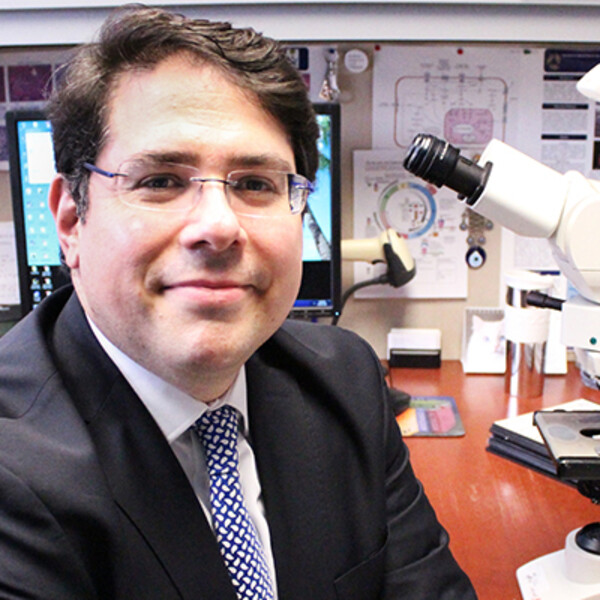Ozgur Mete
MD, FRCPC

Dr Mete is a Consultant Pathologist at the University Health Network and Professor in the Department of Laboratory Medicine and Pathobiology at the University of Toronto.
Dr Mete received his medical degree from Istanbul University in 2001 and completed his residency training in Anatomical Pathology at Istanbul University in 2005. He then did fellowship training in endocrine pathology under the supervision of Professor Sylvia Asa at the University of Toronto.
He was appointed as an academic pathologist at Istanbul University before joining the faculty at the University of Toronto in 2011.
Dr Mete’s research focusses on the translation of basic findings to clinical tests that provide diagnostic, prognostic, and predictive biomarkers for endocrine tumors.
His other interests involve development of practice guidelines, digital pathology, and innovative teaching designs.
In 2013, Dr. Mete received the Danny Ghazarian Resident Teaching Award, and in 2014 the prestigious Wightman-Berris Academy Award for excellence in undergraduate medical teaching at the University of Toronto.
He has lectured in many international meetings, has authored more than 45 textbook chapters including several chapters for the 2017 WHO blue book of endocrine tumors, and more than 125 peer-reviewed articles in endocrine pathology.
Research Synopsis
My research program is based on the translation of basic findings to clinical tests for endocrine diseases.
My work concentrates on the study of novel biomarkers in endocrine tumors and their role as prognostic, predictive, and diagnostic markers.
We have constructed tissue microarrays of several types of endocrine tumors; we analyse novel immunohistochemical biomarkers and FISH probes.
In collaboration with other members of the Endocrine Oncology Group at PMH/OCI, we aim to evolve the pathologists’ role in the era of personalized medicine.
The molecular histopathology prediction models of genetic drivers are made possible by using histomorphology and/or immunohistochemistry in various endocrine tumors.
This research program also helps us to better understand important genotype-phenotype correlations that should be recognized as harbingers of hereditary endocrine tumor syndromes including:
- the classic multiple endocrine neoplasia (MEN) type 1 and 2 syndromes
- hyperparathyroidism-jaw tumor syndrome
- familial paraganglioma syndromes caused by SDH mutations
- von Hippel-Lindau syndrome
- neurofibromatosis type 1
- Carney complex
- McCune-Albright syndrome
- familial non-medullary thyroid cancer syndromes
- as well as newer endocrine tumor syndromes (MEN4, DICER1 syndrome, and glucagon cell hyperplasia-neoplasia syndrome).
An additional area of interest involves the application of Digital Analysis in Anatomical Pathology.
I am carrying out a study of Computer-Assisted Diagnostics (CAD) in thyroid tumors and have assisted in a similar study of prostate carcinomas.
This work will have significant impact for the practice of pathology in the future as we validate the applications of image analysis and neural networks in tissue pathology.
Recent Publications
Cho U, Mete O, Kim MH, Bae JS, Jung CK. Molecular correlates and rate of lymph node metastasis of non-invasive follicular thyroid neoplasm with papillary-like nuclear features (NIFT-P) and invasive follicular variant papillary thyroid carcinoma: The impact of rigid criteria to distinguish NIFT-P. Modern Pathology. 2017; doi: 10.1038/modpathol.2017.9. [Epub ahead of print], PMID: 28281551.
Duan K, Mete O. Algorithmic Approach to Neuroendocrine Tumors in Targeted Biopsies: Practical Applications of Immunohistochemical Markers. Cancer 2016; 124; 871-84.
Onder S, Ozturk Sarı S, Yegen G, Sormaz IC, Yilmaz I, Poyrazoglu S,Sanlı Y, Giles Senyürek Y, Kapran Y, Mete O. Classic architecture with multicentricity and local recurrence, and absence of TERT promoter mutations are correlates of BRAFV600E harboring pediatric papillary thyroid carcinomas. Endocrine Pathology 2016; 27: 153-61.
Zheng S, Cherniack AD, Dewal N, Moffitt RA, Danilova L, Murray BA, Lerario AM, Else T, Knijnenburg TA, Ciriello G, Kim S, Assie G, Morozova O, Akbani R, Shih J, Hoadl KA, Choueiri TK, Waldmann J, Mete O, Robertson AG, Raphael BJ, Meyerson M, Demeure MJ, Beuschlein F, Gill AJ, Latronico AC, Fragoso MC, Cope LM, Kebebew E, Habra MA, Whitsett TG, Bussey KJ, Rainey WE, Asa SL, Bertherat J, Fassnacht M, Wheeler DA, The Cancer Genome Atlas Research Network, Hammer GD, Giordano TJ, Verhaak RGW. Comprehensive Pan-Genomic Characterization of Adrenocortical Carcinoma. Cancer Cell 2016; 29:723-36.
Mete O, Gomez-Hernandez K, Kucharczyk W, Ridout R, Zadeh G, Gentili F, Ezzat S, Asa SL. Silent subtype 3 pituitary adenomas are not always silent and represent poorly differentiated monomorphous plurihormonal Pit-1 lineage adenomas. Modern Pathology 2016; 29:131-42.
Gomez Hernandez K, Ezzat S, Morel CFJ, Swallow CJ, Otremba M, Dickson BC, Asa SL, Mete O. Familial Pheochromocytoma and Renal Cell Carcinoma Syndrome: TMEM127 as a novel candidate gene for the association. Virchows Archiv 2015; 466;727-32.
Cassol C, Mete O. Endocrine Manifestations of Von-Hippel Lindau Disease. Arch Pathol Lab Med 2015; 139:263-8.
Mete O, Tischler A, de Krijger R, McNicol AM, Eisenhofer G, Pacak K, Ezzat S, Asa SL. Protocol for the Examination of Specimens from Patients with Pheochromocytomas and Extra-adrenal Paragangliomas. Archives Pathol Lab Med 2014; 138:182-88.
Mete O, Lopes MB, Asa SL. Spindle cell oncocytomas and granular cell tumors of the pituitary are variants of pituicytoma. Am J Surg Pathol 2013; 37:1694-99.
Chui MH, Cassol C, Asa SL, Mete O. Follicular Epithelial Dysplasia of the Thyroid: Morphologic and Immunohistochemical Characterization of a Putative Preneoplastic Lesion to Papillary Thyroid Carcinoma in Chronic Lymphocytic Thyroiditis. Virchows Archiv 2013; 462:557-63.
Mete O, Ezzat S, Asa SL. Biomarkers of aggressive pituitary adenomas. J Mol Endocrinol 2012; 49:R69-78.
Erovic BM, Harrris L, Jamali M, Goldstein DP, Irish JC, Asa SL, Mete O. Biomarkers in parathyroid carcinomas. Endocrine Pathology 2012; 23:221-31.
Erovic BM, Kim D, Cassol C, Goldstein DP, Irish JC, Asa SL, Mete O. Prognostic and predictive markers in medullary thyroid carcinoma. Endocrine Pathology. 2012; 23:232-42.
Mete O, Asa SL. Pathological definition and clinical significance of vascular invasion in thyroid carcinomas derived from follicular epithelium. Modern Pathology 2011; 24:1545-52.
Mete O, Rotstein L, Asa SL. Controversies in Thyroid Pathology: Thyroid Capsule Invasion and Extrathyroidal Extension. Ann Surg Oncol 2010; 17:386-91.
Honours and Awards
Name: Danny Ghazarian Resident Teaching Award (2013)
Description:
Name: Wightman-Berris Academy Award for excellence in undergraduate medical teaching at the University of Toronto (2014)
Description:
